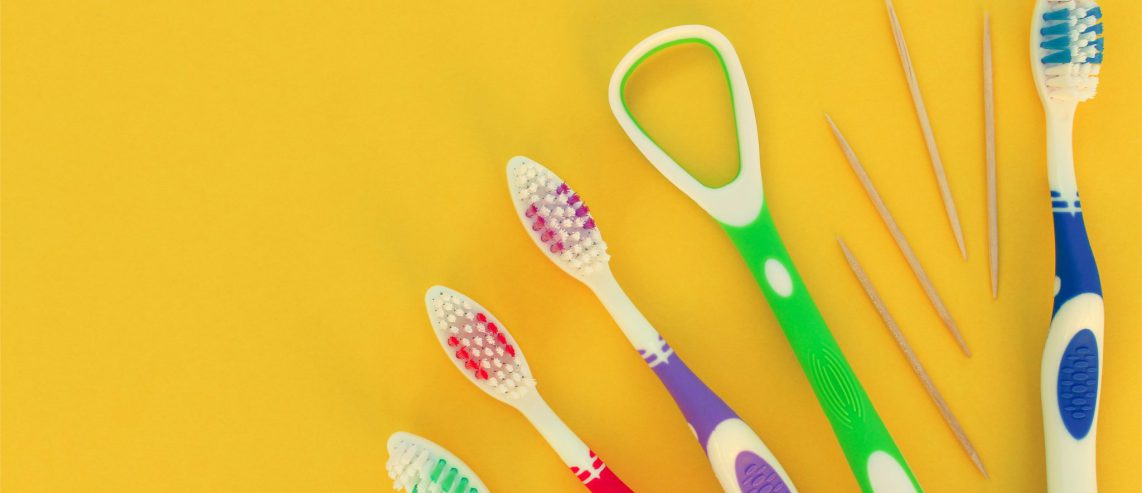You brush your teeth and floss regularly, but have you ever considered cleaning your tongue? Or cleaning it better.
Your tongue is a fleshy collection of muscles covered in little bumps (taste buds or papillae) that help you taste and recognize textures. Because it is responsible for eating, drinking, chewing, swallowing, and communicating, it harbors different types of bacteria.
Good bacteria contribute to a healthy mouth environment, but bad bacteria can cause infections, tooth decay, and bad breath. Tongue scraping can help eliminate bad bacteria, dead cells, and food debris that can cause more serious issues down the road.
What Is Tongue Scraping?
Tongue scraping is the process of raking a small tool across the top of your tongue to remove bad bacteria and other debris from the surface. The idea of tongue scraping has been around for thousands of years.
Many people simply use their toothbrushes to clean their tongues after brushing their teeth. However, a dedicated scraping tool may remove more plaque and bacteria that could later cause an infection.
Never Miss a Beat!
Subscribe to Our HealthBeat Newsletter!
Thank you for subscribing!
You can now select the specific newsletters you'd like to receive.
You are already subscribed.
Subscribe to more newsletters in our email preference center.
Sorry, an error occurred. Please try again later.
Get Healthy Tips Sent to Your Phone!
Tongue-Scraper Benefits
Though tongue-scraping research remains limited, some experts believe regular scraping can help with:
- Bad breath: Like your gums and teeth, your tongue is full of odor-causing bacteria.
- Enhancing the taste of food and drink: Using a tongue scraper could be likened to starting over with a fresh palate: You may notice it’s easier to distinguish between salty, sweet, and bitter tastes.
- Removing bacteria: Some research has shown that tongue scraping twice a day helps eliminate bacteria that can cause dental decay and bad breath.
- Your tongue’s appearance: Tongue scraping can help remove the excess buildup of debris that causes the condition known as coated tongue (or white tongue).
- Improve overall health: You can eliminate bacteria that can cause gum disease, cavities, and other dental problems by scraping your tongue.
Who Should Use a Tongue Scraper?
Everyone can benefit from adding tongue scraping to their dental hygiene regimen. However, people with a buildup of bacteria and dead cells on their tongue (a condition called a coated tongue) may benefit especially. A coated tongue can happen because of several factors, including:
- Smoking.
- Inconsistent or neglected brushing.
- Yeast infections.
- Certain medication use.
- Dry mouth.
Choosing a Tongue Scraper
There are a variety of tongue scrapers on the market, including:
- Plastic scraper: Typically a thin plastic wire bent in a U-shape, plastic scrapers are inexpensive but may need more frequent replacement.
- Brush scrapers: Typically resembling a toothbrush with a tip of short bristles, you’ll want to replace these every three to four months.
- Metal scrapers: Typically a thin, U-shaped metal wire, these generally last longer and are dishwasher safe though they’re usually more expensive.
The choice of which tongue scraper to buy is a personal preference. Most scrapers cost around $10. If you are unsure about which scraper is best for you, you can consult your dental hygienist.
How to Use a Tongue Scraper
Tongue scraping is relatively easy to add to your daily oral hygiene practice by doing the following:
- Brush your teeth and floss as you normally would.
- Stick out your tongue and start the scraper at the very back. (If you have concerns about gagging, you can start in the middle of your tongue and gradually start from farther back as you get used to the sensation.)
- Lightly drag the scraper all the way to the front of your mouth.
- Continue this motion two to three times from back to front, rinsing the scraper with warm water between each scrape.
- Swish your mouth with water and clean the scraper with warm water before storing it away.
The entire process should take less than two minutes. You should perform it in the morning and evening after you brush your teeth. It’s important to remember to continue the American Dental Association’s best practices for good dental hygiene, such as:
- Brushing your teeth twice a day with fluoride toothpaste.
- Flossing between your teeth once a day.
- Eating a healthy diet and avoiding sugary foods and drinks.
- Visiting your dentist regularly for check-ups and cleanings.
Tongue Scraper vs. Toothbrush
Though a toothbrush can also clean your tongue, it is not as effective as a tongue scraper. Studies have shown that tongue scraping is 75% effective at cleaning the tongue, while a toothbrush is only 40% effective. This is because the bristles on a toothbrush can’t remove debris and bacteria between the taste buds as well as the edge of a tongue scraper can.
Cleaning your tongue with a toothbrush and toothpaste may come more easily and cost less. However, combining brushing and scraping can ensure the best tongue health.
Sources
About UPMC
Headquartered in Pittsburgh, UPMC is a world-renowned health care provider and insurer. We operate 40 hospitals and 800 doctors’ offices and outpatient centers, with locations throughout Pennsylvania, Maryland, New York, West Virginia, and internationally. We employ 4,900 physicians, and we are leaders in clinical care, groundbreaking research, and treatment breakthroughs. U.S. News & World Report consistently ranks UPMC Presbyterian Shadyside as one of the nation’s best hospitals in many specialties and ranks UPMC Children’s Hospital of Pittsburgh on its Honor Roll of America’s Best Children’s Hospitals. We are dedicated to providing Life Changing Medicine to our communities.
